Setting goals is like laying the foundation for a successful career.
Goals are the compass that guides us, the roadmap that charts our course, and the fuel that ignites our motivation.
Whether you’re a seasoned professional or just starting out, the importance of goal setting cannot be overstated.
In this post, we’ll take a deep dive into the world of professional goals.
Whether you’re in the early days of the year, in the midst of a career transition, or deep into the hustle, these professional goals examples will serve as a source of inspiration and practical guidance.
What are professional goals?
We all know what a goal is. It’s something that you want to achieve within a certain timeframe.
Professional goals are linked to your working life. They can be short or long-term aspirations that will help you grow professionally and further your career.
To help you achieve your career goals, you can use the acronym S.M.A.R.T when setting them. This stands for:
Measurable
Actionable
Realistic
Timely
Creating S.M.A.R.T goals can help to provide clarity, focus, and motivation so that you can more easily reach your goals in a timeframe that you’re happy with.
Now, let’s take a look at 16 examples of professional goals you may want to set for yourself in 2024…
1. Focus on CPD (continued professional development)
Even if you don’t want to climb any further up the ladder or change careers any time soon, it’s still important to be at the top of your game in your chosen field.
CPD (continued professional development) helps to ensure you have your finger on the pulse in your industry.
How to focus on CPD
CPD can be as involved or as relaxed as you want it to be. If you’re very busy and don’t have a lot of time to spare, then reading a couple of news articles a week (that cover events in your industry) could be enough to help you remain current.
If you have more time then perhaps you want to take a course. There are several online course libraries that cover all different kinds of topics. A famous example you may have heard of is Masterclass.
Masterclass features online courses from celebrities who are at the top of their given field. For example, you can learn about business strategy and leadership from Disney’s CEO, Bob Iger:
Another platform, that focuses more specifically on the business world, is LinkedIn Learning. You can search for any topic that interests you and filter courses by level, software used, and how long they take to complete.
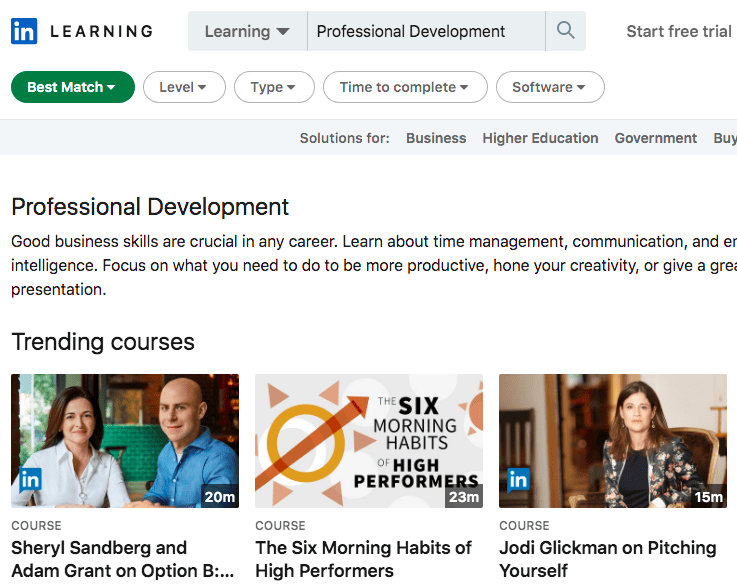
This is a great way to set achievable professional development goals that you can stick to.
2. Improve your public speaking skills
The further you climb up the professional ladder, the more public speaking you’re probably going to be required to do.
This could be during presentations and meetings, or even at public events.
If the idea of public speaking terrifies you, just remember: no one is born a master of public speaking!
If you work on it, you will improve.
How to improve your public speaking skills
The best way to get better at something is to just start. And you can start really small. Take the opportunity to speak publicly whenever it is presented to you. This could be as simple as asking a question at your next team meeting.
It also helps to take advice from some experts. The TEDx Talks Youtube channel has some great videos on public speaking, like this one:
Better yet, TED has an official public speaking course that can help you to improve your skills!
3. Read more
Whatever industry you work in, whatever you want to improve, whatever you want to learn, there’s a book for that. In fact, there are probably several great books on whatever you’re interested in!
And reading is proven to be good for you.
How to read more
This one is easier said than done!
The key is to start small. Make time to read a chapter a day. And if you can’t do that, make time to read just one page a day – you’ve got to start somewhere!
As for finding time to read, you can incorporate this into your lunch break or even block out time in your calendar.
Reading before bed is a great way to form a habit, too. Plus, it’s good for you!
If you really want to get into reading then you could also look at joining a book club – either local or online.
This way you can meet more like-minded people who enjoy the topics you’re interested in – so you’re not only reading more, you’re building your professional network too!
4. Be more organised
Everyone can benefit from being more organised, both in a professional and personal capacity.
Not only will improved organisation reduce your stress levels and increase your ability to focus (because you’re not distracted by desk clutter or a messy task list), it can also make your customers happier.
How to be more organised
One of the easiest and best ways to become more organised at work is to start using a project management system. This will help you to keep everything you need – from discussions with your team, to payments from your clients, and any files you’re working on – all in one centralised place.
You can also set tasks and checklists that ensure you’re getting the most out of every day and that you never forget to do something.
5. Get to know your team better
The average person will spend 30% of their life at work. That’s a lot of time. So why not make it one of your professional goals to get to know your team better?
When you know your team better, you’ll be able to understand how everyone likes to work and communicate, and this should help you work together more efficiently.
It also helps to get to know other teams and departments in your business, especially if you sometimes work on projects together or if you would one day like to transfer over to one of those departments.
How to get to know your team better
This isn’t rocket science – just talk to people more. Ask more questions and maybe even organise some team events that will bring everyone together.
If you’re interested in getting to know people in other departments then ask to take a department tour, or join their meetings. This way you can find out more about different teams in your business and how they operate.
6. Improve team collaboration
In addition to getting to know your team better, another great goal to work on is improving team collaboration.
When teams collaborate successfully it creates a better work atmosphere, improves productivity, and can even result in happier customers.
How to improve team collaboration
There are lots of tools out there that have been built specifically with real-time collaboration in mind, such as Google Drive and Invision – that allow teams to comment on and update live documents together from wherever they are.
When using Project.co, collaboration becomes even easier because you can work on these documents without ever leaving the system.
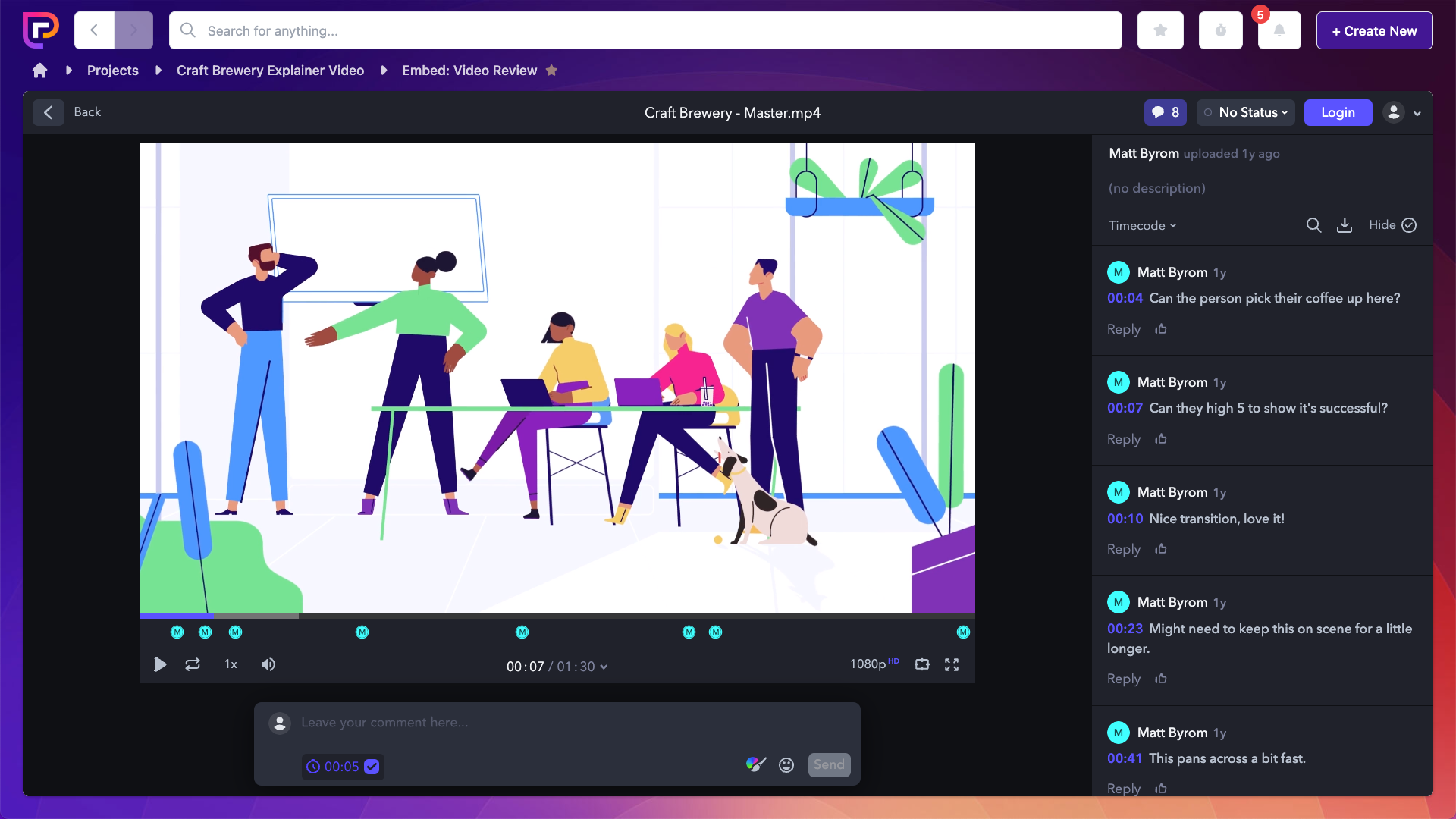
Our embeds tool allows you to embed any live file that you’re working on so that everyone on the project has access and can leave their feedback in real time.
7. Add a new skill to your tool belt
Mastering a new skill is an awesome professional goal because it can give you personal satisfaction to learn something new, but it also helps to improve your CV.
This new skill could be anything that relates to your role, for example, learning how to use a social media scheduler or finally mastering Excel.
How to add a new skill to your tool belt
First things first, set aside some time each day or week to dedicate to mastering your new skill. You can book this directly into your calendar to ensure you don’t forget.
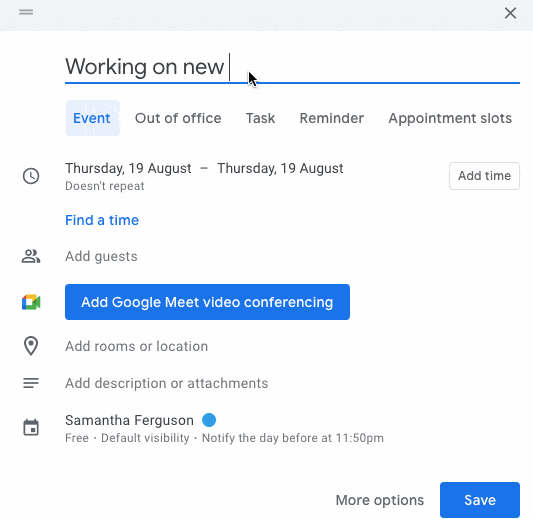
When it comes to the actual learning part, there are tons of online resources out there (most of them, free!) for every skill you could ever possibly want to learn.
Here are the results from a quick YouTube search for “How to draw”:

And “How to use Excel”:
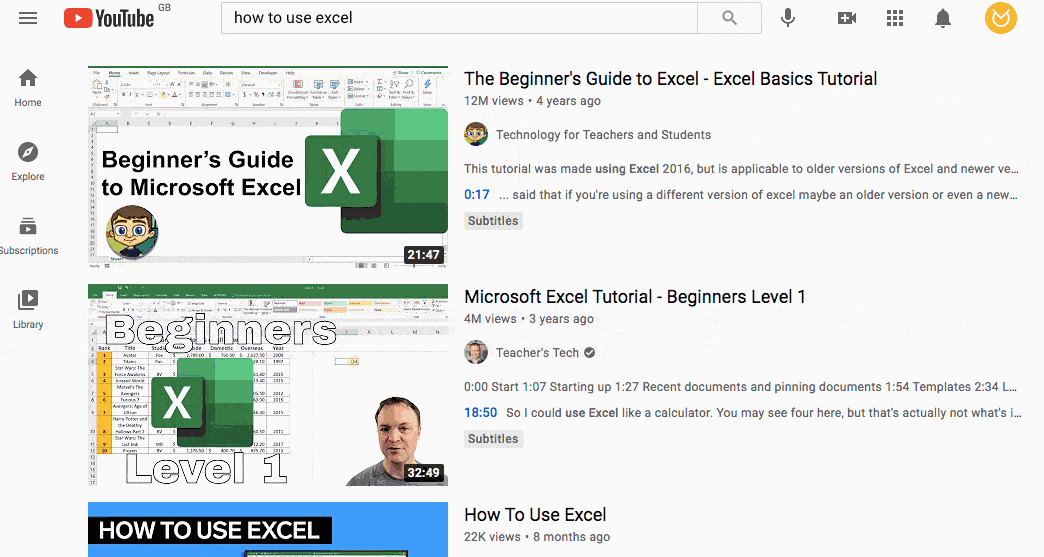
There are several in-depth videos here that would work as a great jumping off point for you to start mastering your new skill.
8. Research your competitors
Although it may not seem like it will directly improve your professional development, researching your competitors can actually be an interesting way to reflect on your own business.
By finding out how your competitors work you can find a new source of inspiration and also discover what not to do.
You should know your competitors inside out. Find out how they got their start, what mistakes they made along the way, and where they’re heading next.
How to research your competitors
There are a few ways you can find out more about your competitors. Firstly, if they have a blog then read it.
Most companies have blogs that they update regularly and there’s a ton of information on there that will help you learn not only about your competitors, but about how they engage with their audience.
Similarly, visiting their social media pages will also help you to find out how they connect with customers and give you an opportunity to spot any issues that customers are having with your competitor (so that you can avoid them).
More and more people are heading to social media when they want to complain about a company.
To further your research on your competitors, be sure to check out their online reviews. This will give you a wealth of knowledge on the things they’ve done right and the things they’ve done wrong, and will definitely give you a lot to learn from.
9. Grow your network
We all know the saying, “It’s not about what you know, it’s about who you know.”
Professional connections can be invaluable, and you never know when you might need someone’s help. Growing your network is a great way to expand your reach in your professional field.
How to grow your network
The obvious place to start when looking to grow your network is LinkedIn. LinkedIn is the largest professional network online and can help you connect with peers in your field, and also people in fields that you may want to navigate towards in the future.
Networking on LinkedIn is really all about interactions. Sure, it helps to post your own content whenever you can but if you really want to grow your network you should dedicate time to interacting with other people’s posts. Like, leave comments, and share – this is the type of activity that people will appreciate and remember.
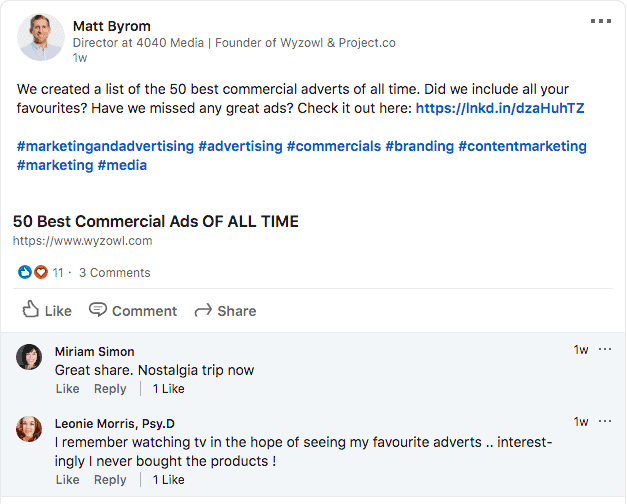
Networking online is great, but it also helps if you can get out to local events in your area. Search for events in your area on sites like Eventbrite and MeetUp to find the perfect networking opportunities:
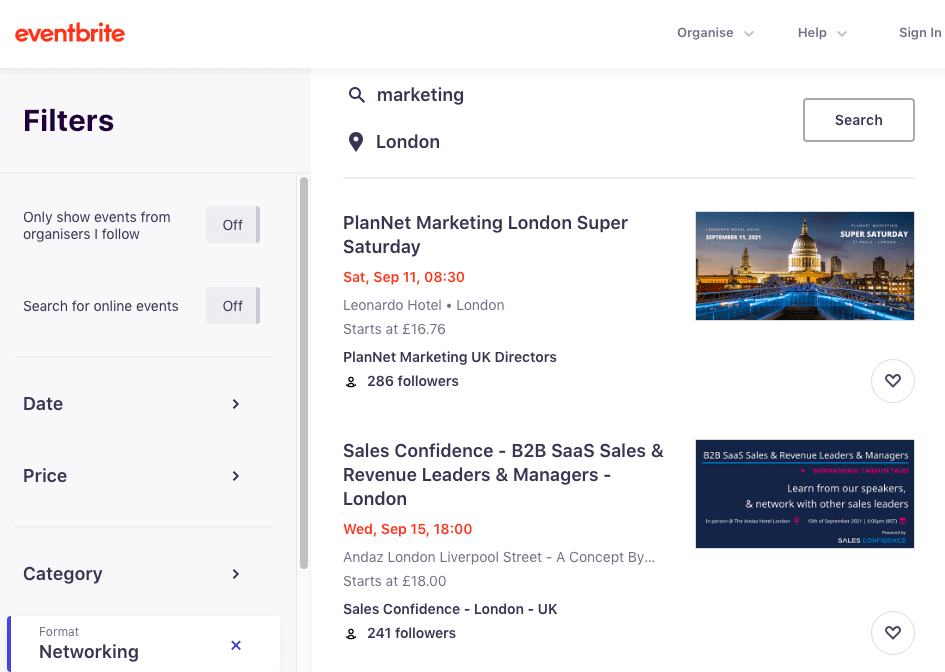
10. Improve your communication skills
Communication is so important in every aspect of life, especially professionally.
According to our Communication Statistics 2024 report, 94% of people think the businesses they deal with could improve when it comes to communication and project management.
How to improve your communication skills
The best way to improve your communication skills with your team, and in your business as a whole, is to agree on the tools that will be used.
If some people use email, some people use Slack, and some people prefer video calls, all of your communications are going to be jumbled and lost.
By agreeing on tools that everyone uses you can keep your communications neat and ensure that the right message reaches the right person every time.
This is another benefit of using a project management system, like Project.co. Our discussion tool ensures that all project communication remains centralised:
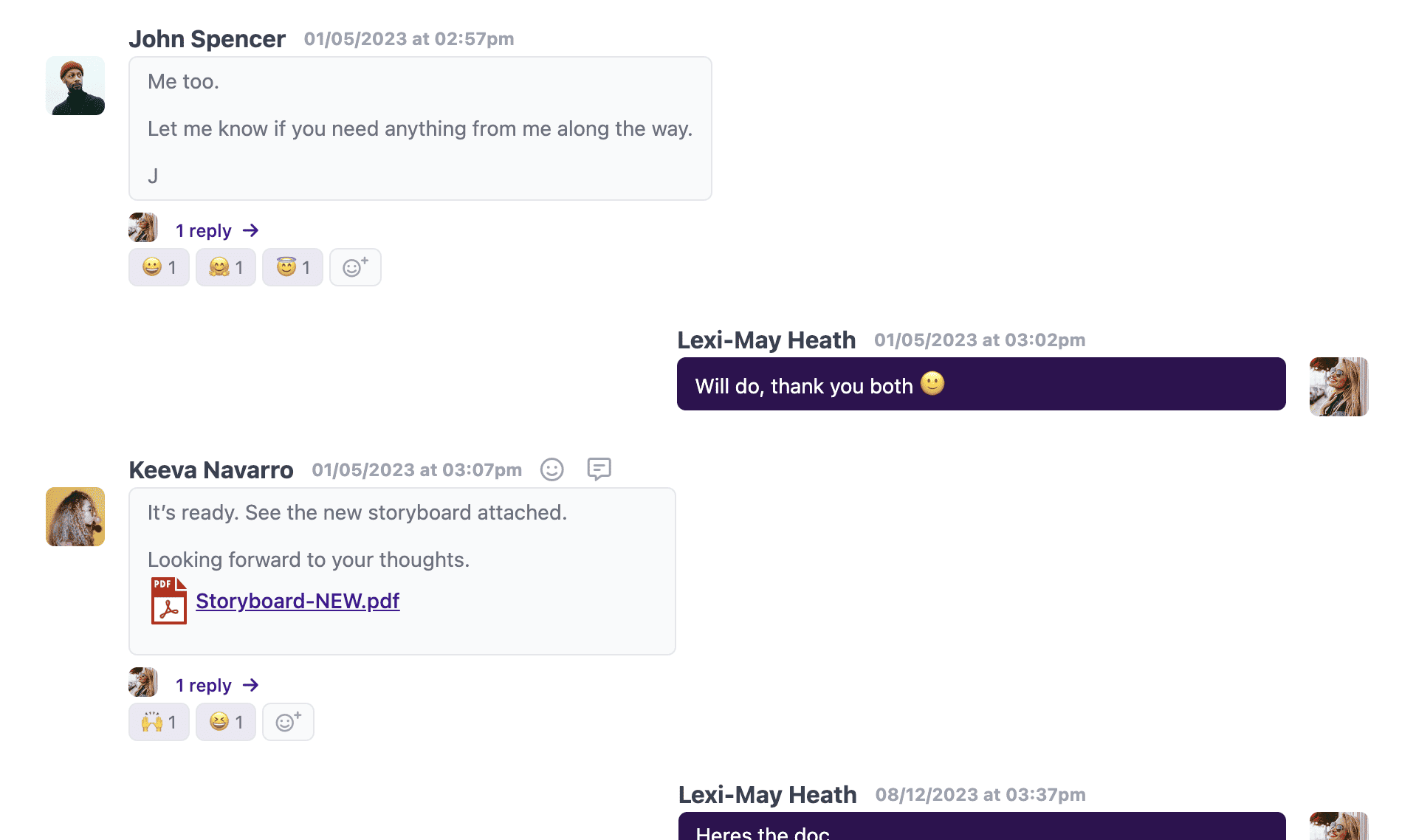
Every message shared is available for everyone to see, and it’s laid out in date and time order.
This is also great if anyone is ever unexpectedly out of the office. Instead of digging through their inbox (or being locked out because it’s password protected), users can head to the project and pick up communications from there.
11. Take on more responsibility
If you feel as though your job has become too easy, and maybe even a little stagnant, then taking on more responsibility could help to revive your love for it again.
In addition, taking on more responsibility can also help you grow both professionally and personally, and this could lead to better opportunities in the future.
How to take on more responsibility
This is all about being proactive. If you see others at work who appear stressed or overwhelmed, offer to help them out.
It can also help to talk to your boss and inform them that you want to take on more responsibility.
12. Chase that promotion
Possibly the most common professional goal is to climb the ladder, and get promoted.
If you’ve been after a promotion for a while, set a goal, give yourself a deadline, and start chasing it!
How to chase that promotion
This is another goal that starts with being proactive and letting your boss know about your ambitions. Once you’ve put it out there in the open it will be easier to work towards your goal.
In addition to voicing your want for a promotion, doing a lot of the goals we’ve already mentioned – taking on new skills, helping others, building your network – will all work to get you that little bit closer.
13. Mentor others
If you want to grow and progress, one of the best ways to do that is to help others grow along with you.
Becoming a mentor is a great way to pass along your professional wisdom and it will also refresh your memory on what you’ve learnt.
This can be a satisfying and rewarding professional goal.
How to mentor others
This is a great goal that not only helps you, but helps others too. And it also encompasses other goals – such as taking on more responsibility and working towards a promotion.
If you want to become a mentor, start by expressing an interest to your management team. They can hopefully recommend people in your business that would benefit from your mentorship and you can start from there.
You can also take mentor classes to learn how to be the best mentor possible. There are several classes on LinkedIn Learning to help you get started:
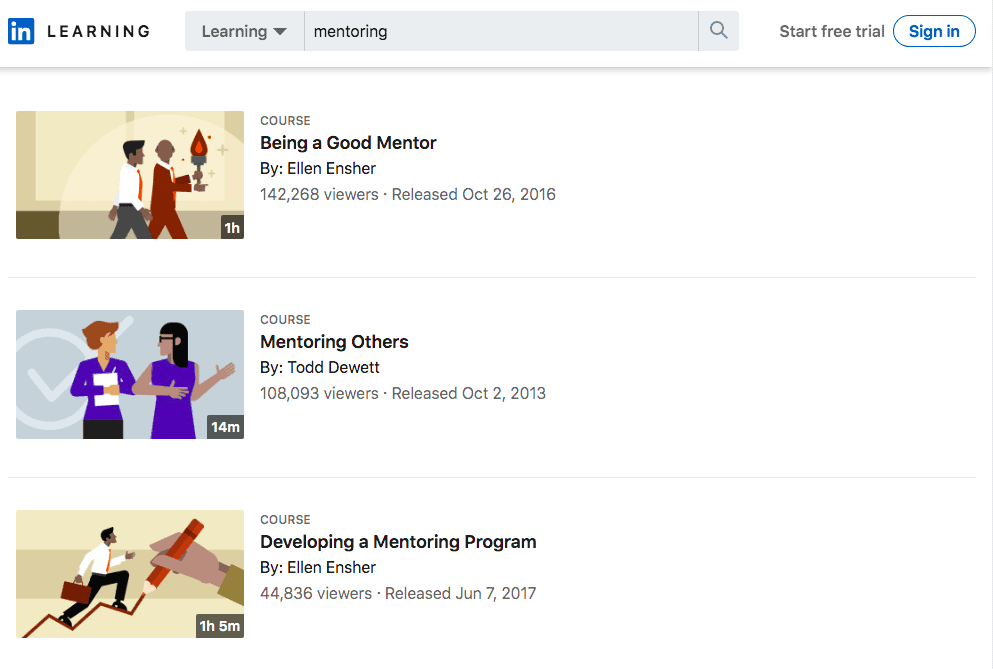
14. Improve your time management
Did you know:
But everyone, even the most successful people (in fact, sometimes, especially those people!), can benefit from improved time management.
When you can better manage your time, you’re less stressed, more productive and happier.
How to improve your time management
If you struggle with time management, the good news is there are several ways to improve this – you just have to find the technique that works for you.
A popular time management strategy you may have heard of is the Pomodoro technique. It’s the process of breaking your day down into manageable chunks – most popularly, 30 minutes.

The idea is that you work for 25 minutes and spend 5 minutes procrastinating. This ensures that when you’re working, you give the task-at-hand your undivided attention. And then you also give your brain a break by taking some free time before starting your next task.
Another way to improve your time management is to work out how long each task usually takes you by tracking time spent on your projects.
Project.co makes this really easy. You just find the project worked on, select the person who worked on it, and enter the time spent.
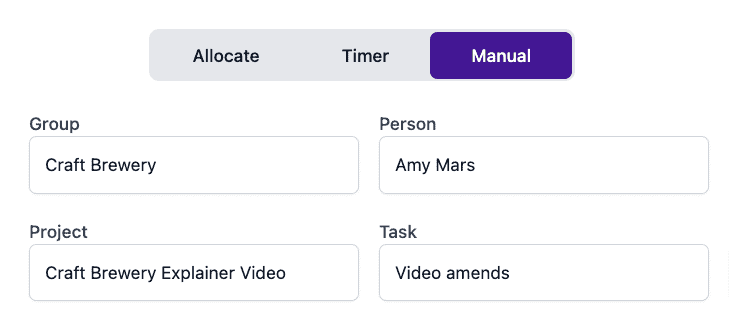
If you do this over several projects, you’ll start to see how long each task should take and this will help you better manage your time and better price your projects in the future.
15. Build your online presence
More and more – especially since the pandemic, our lives are being lived online. So it’s really important to build your online presence across all platforms.
Social media, YouTube, and your website – these are all online channels for people to find you on, both customers and professional connections.
Even the world’s most successful entrepreneurs, like Richard Branson, still put a lot of effort into building an online presence.
Richard Branson updates his YouTube channel regularly:
He also writes a lot on his blog.
How to build your online presence
Start where people spend most of their time online: social media. Make sure you have a presence across all platforms that are relevant to you and be consistent with your posting.
Social media is a fast-paced game, and this means that content quickly becomes obsolete – so post often to ensure you can build your presence.
Another way to grow your online presence to create content that people like to consume, such as YouTube videos or a podcast.
16. Create healthy habits
The easiest way to make sure you do something every day is to make a habit out of it.
When working on a new goal it can be easy to feel like you don’t have time or you should give up, but you wouldn’t think that about brushing your teeth, would you?
Because that’s a habit.
This is the kind of mindset you need to have when it comes to your professional goals. Once you establish your goals as a habit, it will be much easier to chip away at them consistently and start achieving what you have in mind.
How to create healthy habits
Tips for how to be successful when you’re first starting to form new habits include repeating them at the same time everyday – this way you’re less likely to forget – and starting small.
If you feel as though you can’t commit to 15 minutes, start with one minute and go from there. You may find that when your minute is up you actually want to continue working on your new habit for longer.
Final thoughts
It’s important to set yourself regular professional goals so that you can remain motivated and continue growing within your chosen career.
But if you’re busy then this can feel like an impossible challenge.
With Project.co you can save time on unproductive work and spend more time on the things that matter most to you. Click here to get started with Project.co for free.





